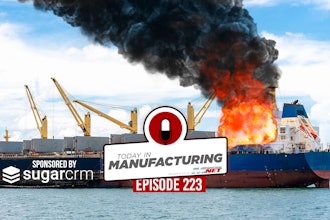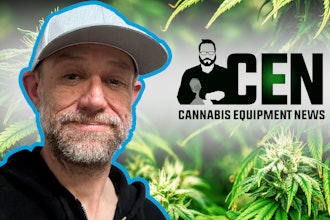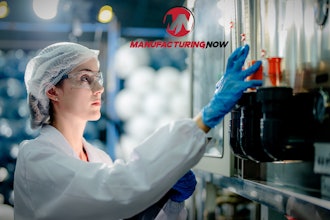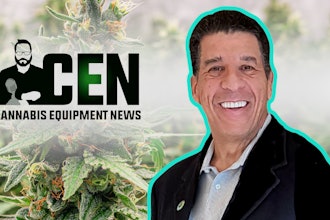Editor's Note: Download the audio version below and click here to subscribe to our newsletter.
This week, Grant Schuster and Jacob Dooley from Accelerant Manufacturing discuss their Production as a Service (PaaS) business model that offers "cannabis manufacturing in a box."
In 2015, Grant Schuster was working in the herbs and spices industry in Maryland when he received a cold email with an offer to jump into the cannabis industry. As he likes to tell it, he decided to keep the herbs and leave the spices behind.
He went to work as an operator for the company and had around 25 to 30 employees making pre-rolls. He also managed various other manufacturing processes and frequently had equipment issues. He saw firsthand how large capital expenses could leave a company hamstrung and realized that the money could do more good if invested in other areas of the business outside of automation. He believed in an opportunity to provide equipment free-of-charge, making high-quality products, and getting paid based on output. In his eyes, it's a business model in which everybody wins.
Schuster brought Jacob Dooley into Accelerant Manufacturing, and their initial focus has been delivering high-quality pre-roll manufacturing equipment. The company produces the equipment in Maryland, with a new facility coming online soon in Missouri.
According to Schuster, the Production as a Service (PaaS) model serves both parties well: Accelerant works with cannabis companies to increase production, regardless of what that level is. As a result, the company can bypass upfront capital expenses and pay per unit produced. The company's flagship product is pre-roll automation, or as Dooley calls it, the "smartest pre-roll machine in the world" — it relies on Internet of Things technology to collect data on every pre-roll. The company combines the data with an assessment of every alarm and error rate to create a predictable production process for every manufacturer.
Many companies still rely on knockboxes to make pre-rolls. Schuster admits that the manual process helped the industry get off the ground and set the standard for an excellent packed joint, but variability can cause problems for cannabis companies. Every operator packs a little bit differently, and companies strive to offer a consistent consumer experience. As an operator, Schuster had two main complaints:
- The pre-rolls were short on product (no one complains when given too much).
- The pre-rolls were packed too tightly, which made them hard to smoke.
Schuster believes that automation is the answer to these common concerns. However, he quickly found out that making pre-roll automation equipment wasn't easy. Pre-rolls only have two inputs — cannabis and paper — but the pair creates a host of variables for a machine.
The grind is essential because if the cannabis is too coarse, the distribution in the cone won't be correct. The cones can also cause problems because Accelerant found that products from the same manufacturer with the same SKU fluctuated 6 to 10 hundredths of a gram.
As a result, the Accelerant team invested in all-electric parts instead of pneumatics and opted for precise motors with more repeatability. They found that these components gave them more control over the end product. The company also invested in accurate, high-speed scales capable of measuring to the ten-thousandth of a gram.
Although every client has their own pre-roll recipe, they educate their partners on best practices. For example, it's crucial to have even compaction throughout the pre-roll's body with enough airflow to keep it burning, but a little bit tighter at the bottom to keep it together.
Accelerant has customers at various entry points, from startups struggling to scale up to operators making 200,000 pre-rolls a month running teams of employees working knockboxes. According to Dooley, the model makes sense for any company producing around 40,000 pre-rolls per month or more and looking to improve output and consistency.
The company's PaaS hasn't only replaced manual labor but other automation equipment that has failed to live up to expectations. Schuster hopes to help companies stop spending money on equipment that gets mothballed, sometimes before it even hits the production floor.
Schuster acknowledges that people are hesitant to move to automation. Part of the reason is staffing, since cannabis operators often don't employ a maintenance staff. Accelerant provides a detailed guide to keep the machine operating optimally, but the company also performs preventative and regular maintenance, including part replacement and machine upgrades.
Accelerant absorbs the initial capital expenses in exchange for long-term contracts. The structure will vary. For example, pre-roll automation is billed per unit, but the company has other equipment in development that will bill per hour of operation or as a monthly recurring charge for unlimited use.
Automation isn't a perfect fit for all products. For example, some companies are making intricate handmade products. However, the PaaS business model offers cannabis companies the ability to get up and running with state-of-the-art automation equipment without the strain of the initial capital expense. Or, as Dooley prefers to call it, "cannabis manufacturing in a box."
Please make sure to like, subscribe and share the podcast. You could also help us out a lot by giving the podcast a positive review on Apple podcast or whatever platform you use. Finally, to email the podcast or suggest a potential guest, you can reach David Mantey at David @cannabisequipmentnews.com with “Email the Podcast” in the subject line.






















